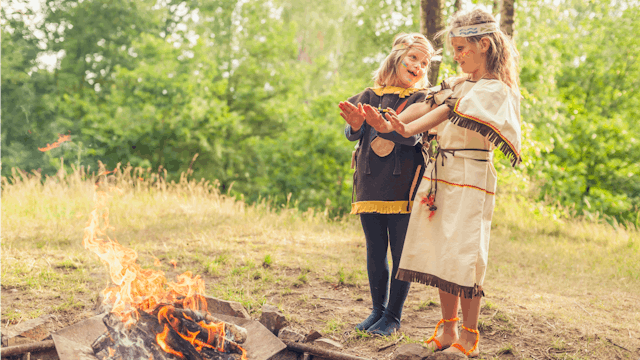Dressing Your Kid Up As Pocahontas For Halloween Isn’t Cute

If your first impulse when you read the title of this piece was to roll your eyes so hard that you could almost see out the back of your head, then congratulations, this post is for you!
That’s because, more than likely, you are part of the millions of people who don’t care whether you allow your child to appropriate another person’s culture for Halloween, and you do so under the guise of “Oh, it’s just a holiday” or “Just let kids be kids.” But don’t worry, this isn’t an attack on everyone’s favorite Pagan holiday — this also goes for any occasion in which there are throngs of people who decide to stick a feather in their hair and throw on moccasins like it’s such a great fashion statement.
Besides the fact that you just don’t care, my guess is that you don’t understand what cultural appropriation is and how it actually harms marginalized groups in society.
How wonderful it must be to wear a costume from another culture, and then take it off and go about your business because, well, it’s not like you actually have to live like them, right? You can easily dress up as a Native American and not actually have to worry about the atrocities they faced. (Don’t worry, I will wait for the usual “my great-great grandmother was a Cherokee princess” line because, you know, grandma or another ancestor was always a princess.)
Or better yet, throw a blackface party and then head home and wipe off, knowing that you never have to live one day as a person of color. But I’m sure it’s cool because you have black friends, right?
Let’s start by outlining what cultural appropriation is not:
A black child dressing up as Cinderella or Snow White is not cultural appropriation.
A Latino child dressing an Ana or Elsa is not cultural appropriation.
A white child dressing as Tiana is not cultural appropriation.
An Asian child dressing up as an English police office is not cultural appropriation.
You got that?
Now, what is cultural appropriation?
According to Lakota Children’s Enrichment, “In a nutshell, it is the use of icons, rituals, aesthetic standards, regalia, or behavior from one culture by another. The person appropriating often has no knowledge of the significance of the icons or regalia or any understanding of the significance or history behind the cultural traditions.”
Just because you “claim” that your child admires a culture, you can still teach them to appreciate someone’s culture without actually imitating it. And 9 times out of 10, when people purchase these cheap costumes for their kids to wear trick-or-treating, they don’t stop to consider the feelings of those from the cultures that are being appropriated.
But let’s look at it like this: If you wouldn’t allow your child to go full blackface in a Tiana costume for Halloween, why is it okay to allow them to dress as a geisha or Native American (if you still refer to Native Americans or First Nations people as “Indians,” that alone tells me where you stand on this).
Plus, let’s not forget Pocahontas was a 14-year-old victim of rape, who was kidnapped from her home and taken to another country. I love Disney just as much as the next person, but why on earth would you want your child to dress up as her for Halloween? Really, am I missing something here?
This is not about policing parents or telling them what they can or should do with their kids. But it is a PSA for parents to really examine what we’re telling our kids and the rest of society when we let our kids put on a “cute” costume without examining what it’s like to be part of a culture that has been systematically oppressed and marginalized.
If you really want to support these cultures, then teach your children about them in other ways. Learn their history. And if you want to purchase something for your child to have because they do admire the culture, buy something authentic from someone who is part of that culture to show that you actually do care.
This article was originally published on